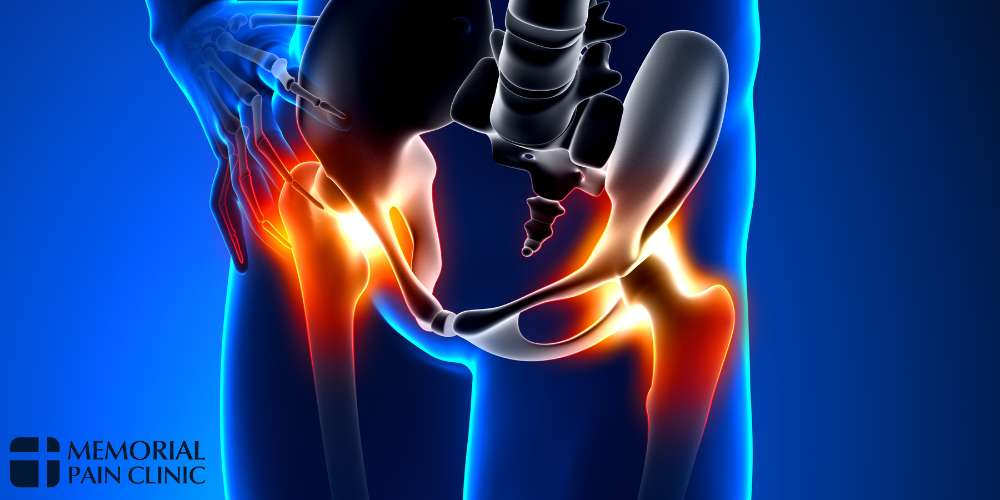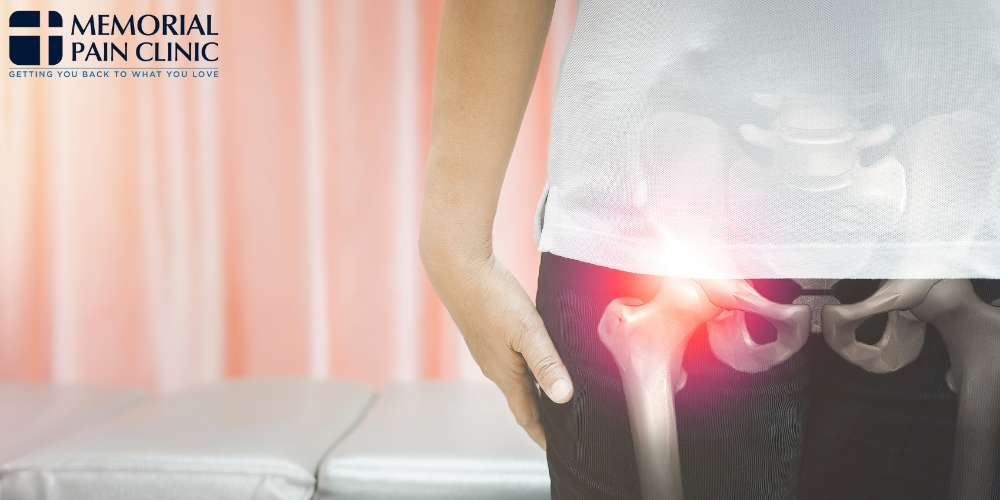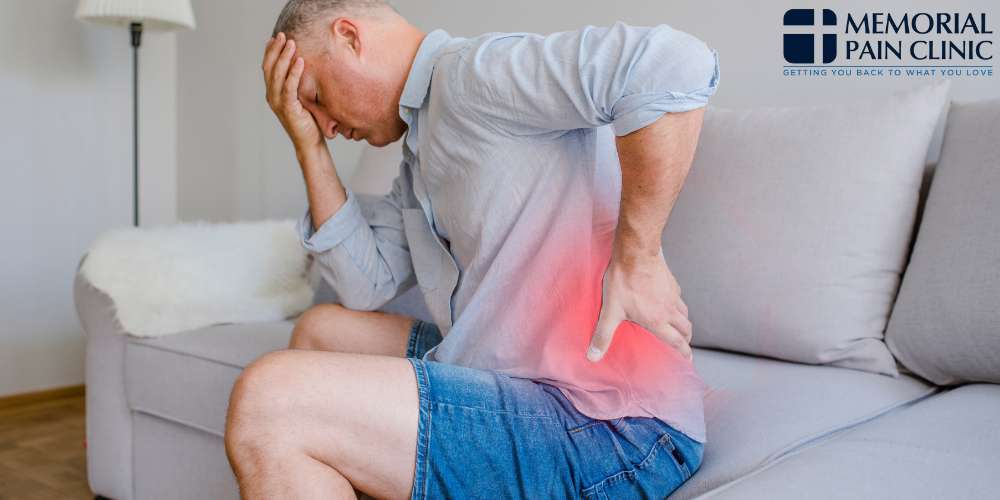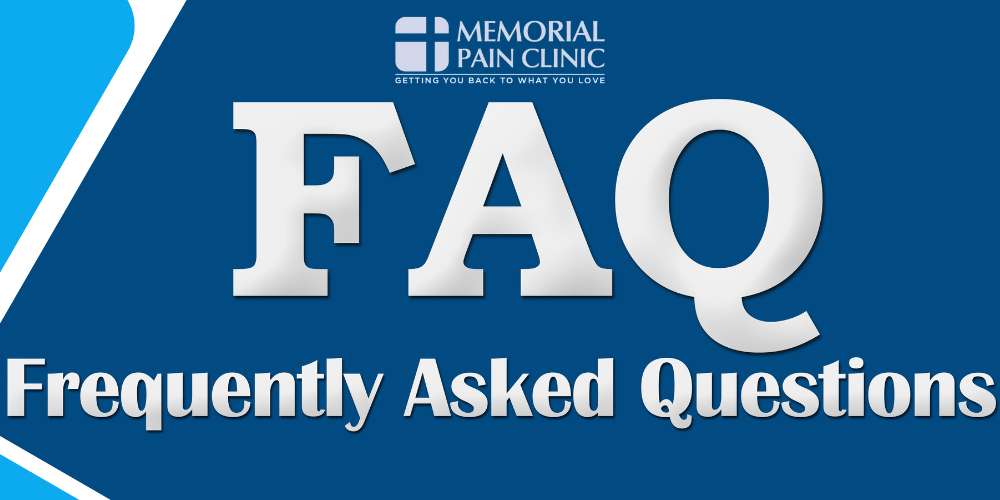Hip Pain Treatment Tulsa, OK
Table of Contents
Our Services
Hip Pain Relief in Tulsa, OK

Dealing with hip pain can significantly impact your daily life, making activities like walking, climbing stairs, and even sitting uncomfortable. At Memorial Pain Clinic in Tulsa, OK, we specialize in advanced pain management techniques to help you regain comfort and mobility. The hip is a ball-and-socket joint that is crucial for many of our daily motions, so it’s important to take good care of this important joint.
Our team of experts understands the complexities of hip pain and offers personalized hip pain treatment plans designed to address the root cause of your discomfort, whether it’s due to arthritis, injury, or other conditions. Explore our range of treatments and find out how we can help you move towards a pain-free life.
To schedule an appointment with one of our providers, please call our office at 918-200-9944 today.
Hip Pain Symptoms
You may experience pain on the outside or inside of your hip, depending on the underlying cause. Common symptoms of temporary or chronic hip pain include:
- Loss of motion in your hip
- Swelling or tenderness in the area
- Difficulty sleeping or sitting
- Pain in your groin, buttocks, or legs
- Limping
- Pelvic pain
- Pain that is worse after prolonged or repetitive activities
- Radiating pain
- Warmth over the hip area
Types of Hip Pain
Hip bone pain can manifest in various forms, each with its own causes and characteristics. Understanding the different types of hip pain can help identify the underlying issues and determine the most appropriate treatment options.
Hip Pain When Walking
This type of pain typically arises from mechanical stress and strain on the hip joint and surrounding muscles. If your hip hurts while walking, you may suffer from osteoarthritis, where the cartilage within the hip joint wears down over time, or bursitis, an inflammation of the fluid-filled sacs that cushion the hip joint. Walking, especially on uneven surfaces or for long distances, can exacerbate this pain, making daily activities challenging.
Hip Pain at Night
Nighttime hip joint pain can be particularly distressing as it interferes with sleep. This pain might be caused by inflammatory conditions like osteoarthritis or rheumatoid arthritis, which tend to worsen after prolonged inactivity, such as sleeping. Other possible reasons include hip injuries or pressure on the hip due to poor sleeping positions.
Hip Pain After Running
Runners might experience hip pain due to overuse injuries such as tendinitis or stress fractures, which result from repetitive strain and impact. Additionally, issues like iliotibial band syndrome, where the ligament that runs down the outside of the thigh becomes tight and rubs against the hip bone, can cause significant discomfort after running or other physical activity.
Burning Hip Pain
This type of pain often indicates a nerve issue, such as sciatica, where the sciatic nerve is compressed or irritated. The burning sensation can also be due to a herniated disc in the spine pressing on nerves that extend into the hip area. In some cases, burning hip pain could be linked to a specific skin or muscle condition that causes inflammation and a burning sensation around the hip joint. It could also be related to arthritis pain.
Chronic Hip Pain
Chronic hip joint pain persists for several months or longer and can stem from various conditions. Osteoarthritis is a common cause, especially in older adults. Other chronic issues might include autoimmune diseases such as rheumatoid arthritis or ankylosing spondylitis. Chronic pain often requires a multifaceted treatment approach that could include medication, physical therapy, lifestyle changes, or even surgery, depending on the severity and root cause of the pain.
Common Hip Pain Causes

While hip pain may commonly occur, the potential causes are varied, so there’s no one-size-fits-all way to treat it. You may feel pain in one or both hips if you have a problem with your joints, spine, or buttocks. Hip pain may also result from problems with your muscles, tendons, or ligaments.
Oftentimes hip pain may be a symptom of an underlying disease or health condition that affects your lower back, but you feel the pain in your hips instead. Common causes of hip pain include:
- Bursitis
- Arthritis
- Fractures or sprains
- Sciatica
- IT band syndrome
- Muscle strains
- Hematoma
- Pinched nerves
- Tendinitis
- Dislocation
Hip Arthritis
Arthritis reduces cartilage (which increases friction) between the joints. When cartilage becomes damaged or worn down, the affected joint usually becomes inflamed and restricts motion, causing pain. Osteoarthritis gradually develops as we age, whereas Rheumatoid Arthritis often has system-wide symptoms and a genetic relationship.
Hip Bursitis
Bursae are fluid-filled cavities that reduce friction and assist in joint movement. Chronic overuse, trauma, infection, or arthritis may cause inflammation, joint pain, stiffness, and swelling. Symptoms usually improve with conservative treatment.
Endometriosis
Disorder when the cells lining the uterus grow in other areas of the body, leading to diffuse pain, irregular bleeding, and possible infertility. The cause of the migration is unknown, but there may be a genetic component involved. Symptoms may include: painful periods, pain in the lower abdomen before and during menstruation, mild to severe cramps, & pelvic, abdominal, low back, or leg pain.
Interstitial Cystitis
Pain associated with chronic inflammation of the bladder wall. The cause of inflammation is unknown and is often misdiagnosed as a urinary tract infection. Symptoms include diffuse pelvic pain, urinary discomfort, frequency, and urgency.
Muscle Pain
Muscle pain, aches, spasms, or tightness may result from damage to the muscles or nearby soft tissue. Pain may be perceived at a location other than the original stimulus (referred pain).
Sacroiliac Joint Inflammation
These joints make up the rear part of the pelvic region, located between the sacrum (vertebra S1-S5) and the ilia (hip bones). They facilitate twisting motions when we move our legs. If inflamed, the pain might radiate throughout the pelvic and lower back.
Visceral Pain (Organ Pain)
This is referred pain from when the internal organs are damaged. Not all organs produce painful stimulus, however, minor lesions in the hollow organs (stomach, bladder, or ureters) can produce severe pain. Symptoms will often be pain in the abdomen, pelvic, or lower back region, and may be hard to describe the precise location.
Hip Pain Treatment Options in Tulsa, OK

To treat hip pain effectively, the doctors at Memorial Pain conduct a comprehensive health exam to diagnose the underlying cause of your pain so they can create an individualized treatment plan. They specialize in interventional procedures meant to reduce your pain and help improve the quality of your life through pain management and rehabilitation.
In mild cases, ice and anti-inflammatory pain relievers may help. In more severe or chronic conditions, steroid injections in which your doctor injects medication directly into your hip joint may effectively help manage the pain. Often, controlling inflammation in your hip joint is one of the keys to relieving pain, and steroid injections can do that.
Other interventional treatments for your hip pain may include:
Many times, it isn’t just one treatment that relieves your hip pain, but a combination of therapies. The doctors at Memorial Pain Clinic find the best set of solutions to effectively manage your hip pain and treat both the underlying causes as well as your symptoms.
In severe cases, hip replacement surgery may be necessary to correct the issue. Joint replacement surgery is a viable option in cases where the hip joint is severely damaged or degraded. However, hip surgery is generally reserved for cases where conservative treatments have not helped the pain.
Learn more about the comprehensive treatment options by calling or scheduling an appointment online today.
Hip Pain Exercises
Several exercises can help alleviate hip pain by strengthening muscles, improving flexibility, and promoting proper alignment and movement patterns. During physical therapy, a qualified physical therapist can help you practice these exercises to ensure proper movement. Some of the most effective hip pain exercises include the following.
- Hip flexor stretch
- Piriformis stretch
- Clamshells
- Hip bridges
- Side leg raises
- Hip rotations
- Hip flexor strengthening
- Lunges
Hip Pain FAQs

What Can Cause Hip Pain in a Woman?
Hip pain in women can arise from a variety of causes, ranging from overuse injuries to degenerative conditions. One common cause is osteoarthritis, which occurs when the cartilage cushioning the hip joint wears down over time, leading to pain, stiffness, and decreased range of motion. Women are more prone to osteoarthritis due to factors like hormonal changes, genetics, and anatomical differences in hip structure.
Hip fractures are more prevalent in older women, especially those with osteoporosis, a condition characterized by weakened bones. Fractures can occur from a fall, direct trauma, or even minor stress on weakened bones. Hip fractures typically cause severe pain, swelling, reduced blood flow, and difficulty bearing weight on the affected leg.
Women may also experience hip pain due to gynecological issues such as endometriosis or pelvic inflammatory disease (PID), which can cause pain in the hip area. Additionally, conditions like sciatica, where the sciatic nerve is compressed or irritated, can cause radiating pain from the lower back down to the hip and leg.
Furthermore, pregnancy-related changes, such as increased weight and hormonal fluctuations, can strain the hips and pelvis, leading to discomfort and pain, particularly during the later stages of pregnancy. This can manifest as hip pain, pelvic girdle pain, or sacroiliac joint dysfunction.
What Causes Hip Pain That Radiates Down the Leg?
Hip pain that radiates down the leg is often caused by compression or irritation of the sciatic nerve, a large nerve that runs from the lower back down through the buttocks and into the legs. This condition, known as sciatica, can result from various factors, such as a herniated disc in the spine, spinal stenosis, or piriformis syndrome. The compression of the sciatic nerve can lead to sharp, shooting pain that travels from the hip down the back of the leg, sometimes extending through the soft tissues all the way to the foot.
What Is the Fastest Way to Relieve Hip Pain?
The fastest way to relieve pain in the hip depends on the cause of the pain. However, some general strategies include rest, applying ice packs to reduce inflammation, and taking over-the-counter pain relievers such as ibuprofen or acetaminophen. Gentle stretching and low-impact exercises like swimming or walking may also help alleviate discomfort by improving flexibility and strengthening the muscles around the hip joint. Additionally, using supportive devices such as cushions or braces and avoiding activities that worsen the pain can aid in faster relief.
Can Sciatica Cause Hip Pain?
Yes, sciatica can cause hip pain. Sciatica occurs when the sciatic nerve, which runs from the lower back down through the buttocks and into the legs, becomes compressed or irritated. This compression can result in intense pain that radiates from the lower back or buttocks down through the hip and into the leg. Depending on the severity and location of the compression, individuals with sciatica may experience varying degrees of hip pain, ranging from mild discomfort to sharp, shooting sensations.
What Is the Best Injection for Hip Pain?
The best injection for hip pain often depends on the underlying cause of the pain. One common and effective injection for hip pain is a corticosteroid injection. This injection delivers a powerful anti-inflammatory medication directly into the hip joint or surrounding tissues, reducing inflammation and alleviating pain.
Corticosteroid injections can provide significant relief for conditions such as osteoarthritis, bursitis, or tendinitis. Another option is hyaluronic acid injections, which can help lubricate the hip joint and reduce friction, particularly for individuals with osteoarthritis. The proper treatment ultimately depends on what your provider determines is the best course of action.
Relieve Hip Joint Pain in Tulsa, OK, at Memorial Pain Clinic
At Memorial Pain Clinic in Tulsa, OK, we understand the impact that hip pain can have on your daily life. Our dedicated hip specialists are committed to providing personalized and effective treatment options to help you find relief and regain mobility. Whether you’re experiencing hip pain due to osteoarthritis, bursitis, or another underlying condition, we offer advanced pain management techniques tailored to your needs.
With our compassionate care and comprehensive approach, we strive to empower you on your journey to a pain-free life. Contact us today to schedule a consultation and take the first step towards overcoming foot, hand, back, leg, hip, and knee pain.
